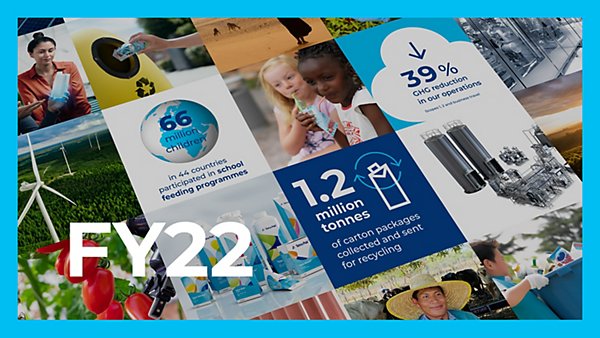The challenge
Providing nutritious food to a rapidly growing global population is a challenge for today’s food systems1. As the global population reaches 8 billion and is predicted to pass 9 billion by 20502 the challenge of increasing food production without negatively impacting the environment grows.
We need to find a way to decrease our environmental impact while increasing our food production so that less of it gets wasted and vulnerable people no longer go hungry.
One vital way to improve food availability is to improve how food is processed, packaged and transported globally. We are committed to playing a key role and together with consumers, governments, food and beverage manufacturers and other stakeholders, we can transform our food systems.
How we can contribute
Pioneers of aseptic technology
We pioneered the use of aseptic technology and continue to innovate processing and packaging technologies to provide food protection throughout the product lifecycle. By extending the shelf life of food without the need for added preservatives or refrigeration, aseptic solutions contribute to food-system resilience. And our paper-based carton packaging helps prevent food waste by protecting food and beverages from physical damage, heat, light, and potentially harmful bacteria.
Increasing locally produced quality milk
Through programmes like the Dairy Hub Model, we are supporting smallholder farmers to increase their productivity, market access, profitability, and livelihoods. We’re providing access to training services and technology needed to help them improve farm productivity, milk availability and quality.
Innovation in ingredients
We are innovating to source nutrients like protein in an efficient and sustainable way. And we are collaborating to turn by-products from food production into added-value ingredients, reducing food waste and making the most of raw materials.
In collaboration with Mycorena, we are producing a meat replacement product from fungi. The process involves using microorganisms to make protein-rich food including alternatives to meat, seafood and dairy. Along with the potential for a lower carbon footprint3, there is the scope for significantly reduced land and water use, compared with traditional animal protein sources.
Read more about alternative plant proteins
Another example is our engagement with Yelte, a start-up that is developing plant-based drinks from Hemp seeds, a unique raw material that is resource-efficient and nutritious. We have been testing the functionality of the hempseed-based drink to maintain a high protein content without affecting the mouthfeel.
Collaborations for collective action
The key to pursuing meaningful change is to recognise that change is not just one thing. Change happens through collaboration with our customers when we work together to address global challenges related to food security and nutrition. This is the objective for Food for Development to support our customers and drive development in the dairy and food value chain.
Explore the collaborations
How to feed a growing population
Hear what Arlene Mitchell, Executive Director at the Global Child Nutrition Foundation, says about securing safe & nutritious food for almost 10 billion people by 2050. A thought leader in the area of child nutrition, education and agriculture, she has previously worked for the Bill & Melinda Gates Foundation and the UN World Food Programme.
Read the interview on tetralaval.com















